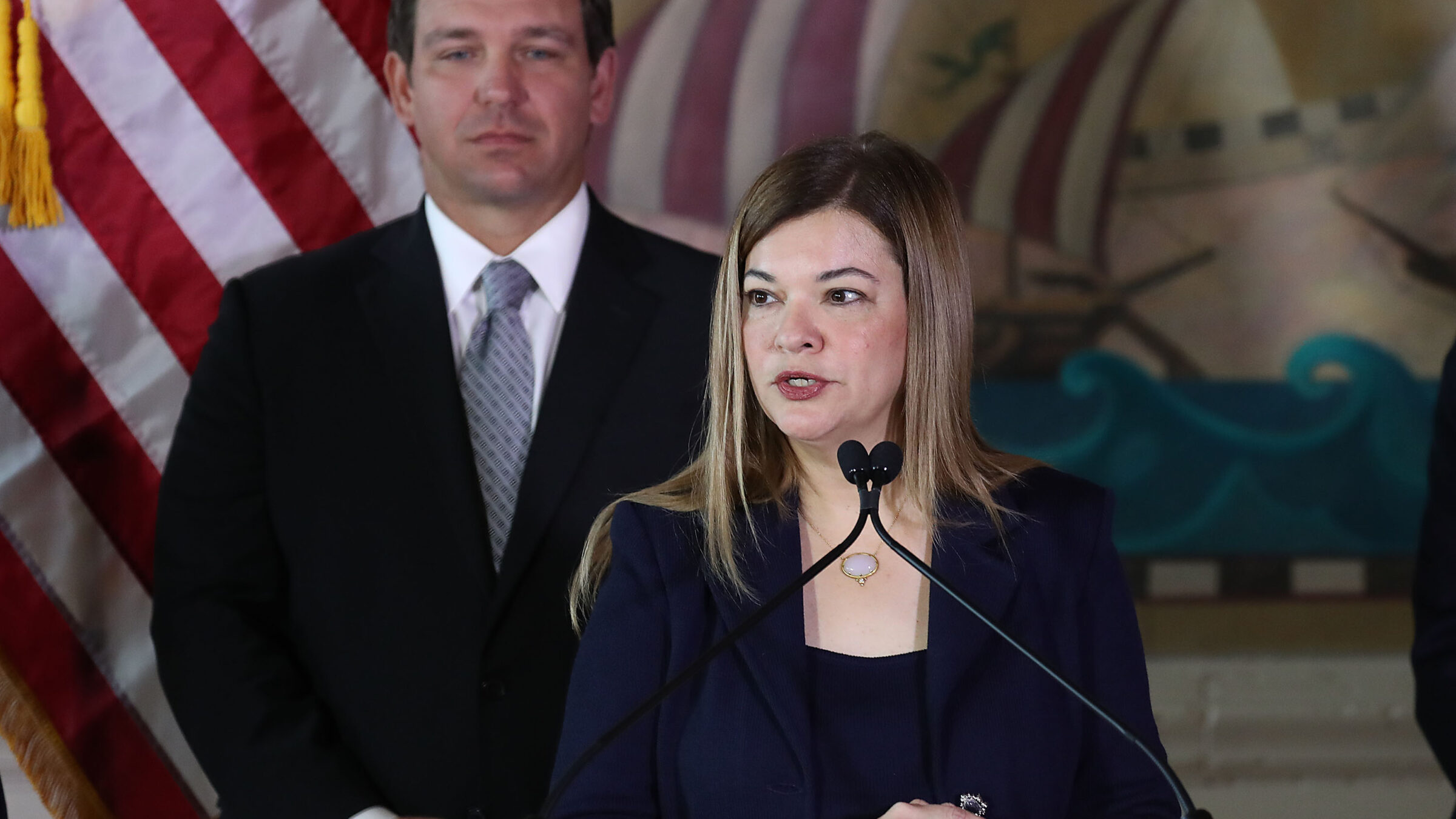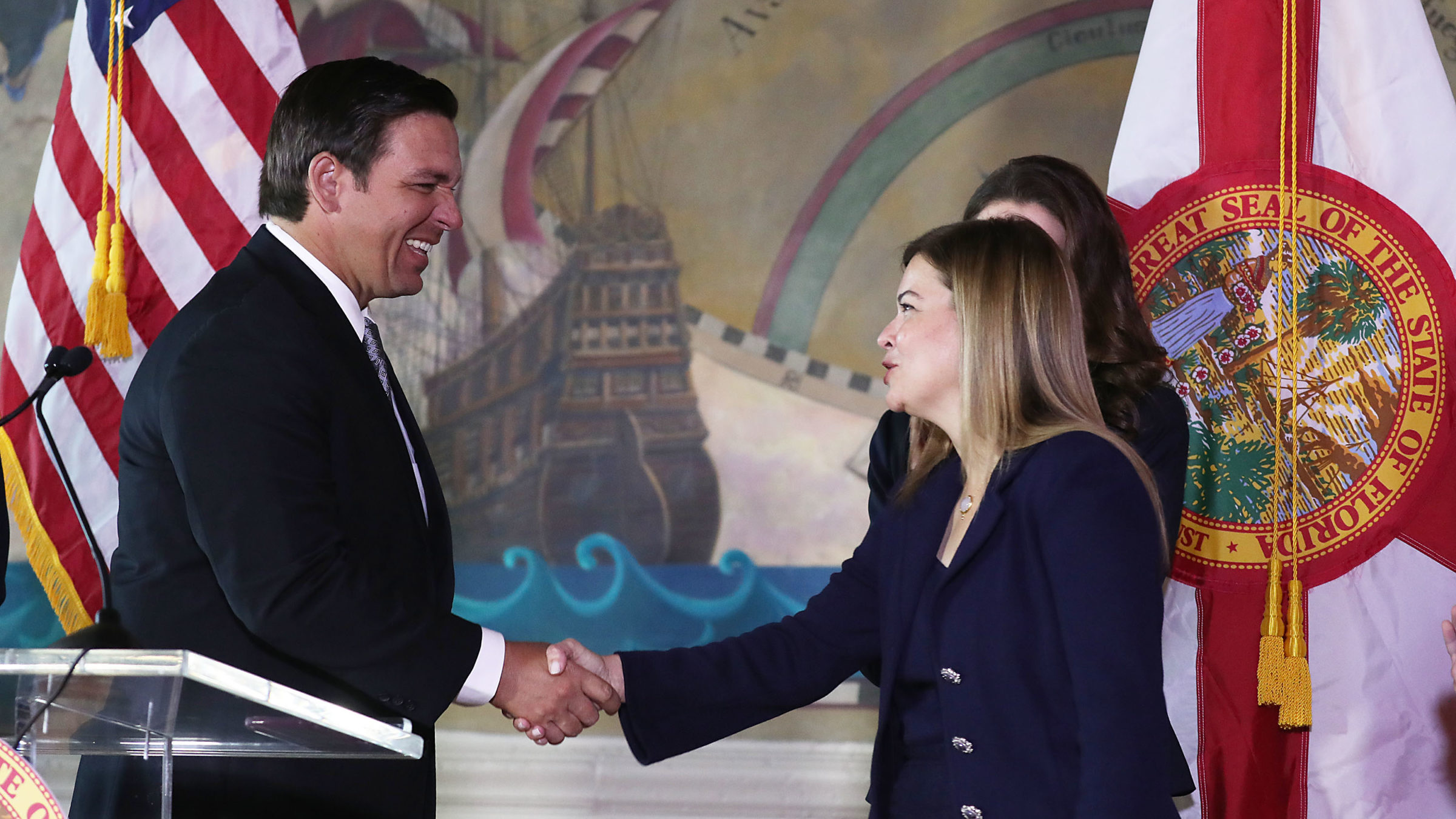Welcome to the FedSoc Twelve, a Balls & Strikes series about some of Donald Trump’s most unhinged judicial appointees. These judges, whether in their legal opinions or their off-the-clock conduct, have continued to push Trump’s agenda from the bench, forming something of a life-tenured Originalism Caucus within the federal judiciary. This summer, we’ll be checking in on these men and women now that they’ve gotten a chance to spread their wings during the Biden administration—and as they fight to be first in line for a Supreme promotion the next time Republicans control the White House.
The Résumé
Judge Barbara Lagoa was born in south Florida to parents who fled Cuba after the Cuban Revolution. A longtime Federalist Society member, she attended Columbia Law School and worked at two different BigLaw firms. She took a job in a federal prosecutor’s office in 2003, then got appointed to a state court of appeals by then-governor Jeb Bush in 2006.
Lagoa spent the next decade-plus grinding away in a Miami courthouse, but in the last few years, the powers that be have rewarded her for it: In 2019, Governor Ron DeSantis appointed her to the Florida Supreme Court. (Federalist Society founder Leonard Leo helped interview her for the job, and although she says she can’t remember what he asked her, she got the gig.) Less than a year later, Trump appointed her to the Eleventh Circuit, which hears cases out of Florida, Alabama, and Georgia. Lagoa’s confirmation flipped what had previously been a court evenly divided between Democrats and Republicans to a Republican-majority court.

(Photo by Joe Raedle/Getty Images)
The Opinions
That Republican majority has rushed to support reactionary politicians and politics within their jurisdiction, and Lagoa has been on the bleeding edge of that push. Back in 2018, nearly two-thirds of Floridians voted to approve Amendment 4, which automatically restored voting rights to nearly all people convicted of felonies after they completed their sentence. The Republican-controlled Florida Legislature, however, countered by passing a law declaring that a sentence was only “complete” after affected people paid all their court costs, fines, or fees. While Lagoa was on the Florida Supreme Court, she heard oral argument about the meaning of Amendment 4 and made very clear that she supported the legislature’s position, citing “reams … of op-ed pieces and editorials” that agreed with it. Set aside that Florida Times-Union editorials are not the law; Lagoa was letting everyone know what she thought.
At first, a three-judge panel of the Eleventh Circuit decided that it was an unconstitutional poll tax to make ex-felons pay fees and fines to participate in democracy. But the state appealed to the entire Eleventh Circuit, and in the meantime, Lagoa was confirmed to the Eleventh Circuit. Federal judges are supposed to recuse in cases on which they’ve worked previously, but she declared that she wouldn’t. When she was on the state supreme court, Lagoa said, she was only deciding what Amendment 4 meant under state law, not whether it violated the federal Constitution, so it was fine for her to hear this case, too. Predictably, she voted to uphold the Florida law, disenfranchising a million people in the process.
Lagoa has fought to roll back gay and trans rights as fiercely as she’s fought to roll back voting rights. In Otto v. City of Boca Raton, the city of Boca Raton and county of Palm Beach banned so-called “conversion therapy,” where (typically) a parent sends their child to a “therapist” who tries to harangue the kid into not being gay or trans anymore. The American Psychiatric Association, American Psychological Association, and American Counseling Association all strongly oppose conversion therapy as ineffective and harmful. The Eleventh Circuit, undeterred, held that the freaks who “practice” this “therapy” have a First Amendment right to perform this “treatment.” Lagoa joined this opinion without comment.
Late last year, in Adams v. School Board of St. Johns County, Lagoa took a more active role, writing an opinion for the entire Eleventh Circuit that upheld separate-but-equal bathrooms for trans students and implied that students claim to be trans to be bathroom predators. She also took the unusual step of writing a concurrence to her own opinion—the judicial equivalent of a P.P.S. on a yearbook signature—loudly warning that trans women playing in school sports could undermine Title IX of the Civil Rights Act. Given that the case wasn’t about high school sports and that the plaintiff was a trans man, not a trans woman, it was a bizarre rant—one she probably had to confine to a concurrence because she couldn’t get any other judges to sign onto it.
And, just last month, Lagoa was on a three-judge panel upholding an Alabama law that, among other horrific things, banned gender-affirming care for trans teenagers, thus forcing them to go through puberty for the wrong gender—a result that experts say could entail severe mental health consequences. A federal district court had granted a preliminary injunction blocking the law’s enforcement, finding that it likely discriminated against transgender people and that parents have a constitutional right to make healthcare decisions for their children.
Lagoa, however, wrote the opinion throwing out that injunction, writing that plaintiffs needed to prove that their rights were “deeply rooted in the Nation’s history and tradition”—a nod to Dobbs v. Jackson Women’s Health Organization, the Supreme Court decision that overturned Roe v. Wade. Because transgender people weren’t receiving hormone therapy in 1868, she wrote, they didn’t have the right to receive it in 2023. It is the same strategy that Republican judges everywhere are using to hollow out civil rights: By characterizing the right the plaintiffs sought as narrowly as possible—as a constitutional right to gender-affirming care, as opposed to a constitutional right to make decisions about your body—Lagoa shut the courthouse doors, throwing the plaintiffs to the mercy of the Alabama legislature. Thanks to Lagoa’s opinion, similar laws in Georgia and Florida will likely take effect soon, too.

(Photo by Joe Raedle/Getty Images)
The Weird Shit
To get on a federal court, you have to know the right people. And when you’re a Republican, knowing the right people almost always means knowing people in the Federalist Society. And not only did Leonard Leo interview Lagoa for the Florida Supreme Court job, but she also married Paul Huck, Jr., the so-called “godfather of the Federalist Society in Miami.”
This power couple has remained intimately involved in Republican politics: Lagoa continues to speak at Federalist Society events, including moderating FedSoc panels at Pat Roberton’s law school, where she joked that in today’s “Orwellian” society, “I’m not sure I can call myself a woman anymore.” (This woman is obsessed with the idea that somewhere, a trans person might be having a good day.) When Donald Trump was facing legal trouble last year for hoarding top-secret documents at Mar-a-Lago, he suggested that Huck oversee the FBI’s review of the documents, an idea that even the Eleventh Circuit rejected.
Given Lagoa’s connections, it’s not surprising that she was on the very short list to take Ruth Bader Ginsburg’s seat in late 2020. Trump himself was fascinated by the idea and believed that appointing Lagoa, a Floridian, might help him win reelection. In fact, his team was so worried he might pass over Amy Coney Barrett for Lagoa that they had to resort to extremes, reminding him that Jeb Bush, whom Trump hates, originally appointed Lagoa to a Florida state court. That was enough; Lagoa never even never got a chance to interview for the job. It really is all about who you know!
Still, Lagoa’s name keeps getting mentioned as a future Supreme Court nominee; shortly before nominating Barrett, Trump himself told a Lagoa supporter to “let her know she’s going to have her chance” down the road. She’s young, she’s full of hate, and she’s willing to ignore any putative limitations on her power. If Trump wins next year, he may well give her that chance.


